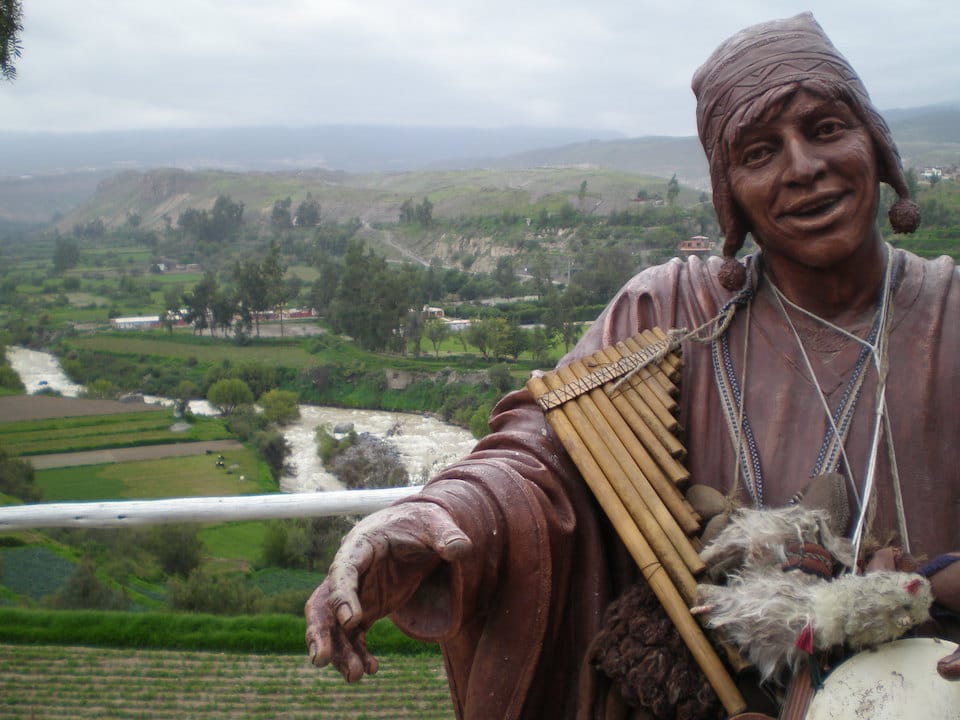Rumor has it, you MUST be at Machu Picchu for “the sunrise”. Common wisdom (family, friends, and even experienced travelers) and many books highly recommend making it up to the site in time to witness the sun sprinkling its golden rays over the Inca Citadel. Sounds amazing to me! Not to be a spoilsport, but what if the sun and earth decide not to cooperate with your plans that morning? Especially during the rainy season (again, roughly November to April), it’s possible the morning can be foggy with low visibility. In fact, this exact thing happened to us on a trip there, in December 2016. We arrived at the site in the morning of our second day to discover a thick blanket of fog shrouding nearly everything. We had fun taking photos of ourselves celebrating our “sunrise” at Machu Picchu – with a white fog background. Good times! But we were thankful for the lovely and sunny day we had the day before, with lots of good and varied visibility (advantage of visiting more than once on the trip).

Of course, making the effort to wake up early and make it to a special place and see the sunrise is a wonderful life experience anywhere. And I would agree – it’s probably even more amazing at Machu Picchu! But is it so much more amazing than a “sunset” or the sunlight finally breaking through the clouds after a morning of fog? In my book, those can be just as moving. I don’t want to take anything away from the sunrise experience, but I don’t believe it’s the most important focus for planning this part of the trip. Sorry. Is it worth it? Yes! But so are many other things, and it’s not guaranteed, even during the dry season. That said, it is more likely to be a possibility then, so if it’s a priority for you, June to September might be your ideal travel dates!
There’s more to do in Cusco and Lima
If you have more time in Cusco and you’ve already done a tour of the city, I’d recommend a visit to the Machu Picchu or Inca museum at Casa Concha that holds the largest collection of Machu Picchu artifacts in the world. In addition to the 366 museum-quality objects returned by Yale University in 2011, the collection includes the totality of fragments resulting from the excavations, which are kept in storage and studied by local and international researchers. And don’t forget the Chocolate Museum – a kids (and some adults!) favorite.
A visit to the large, open market in the neighborhood of San Pedro (also located in the city center), offers tourists a chance to experience some fabulous local flavor. Hopefully, you can get a Cusquenan (a person from Cusco), or even your guide, to join you. Finally, there is the lesser- known Planetarium Cusco, for a particularly Incan view of space. If you want to walk with the Incas a bit more, consider visiting Moray & the salt mines of Maras while in the Sacred Valley, or lesser known Inca ruins in another part of the region, at Tipon.
There are so many fabulous restaurants in Lima (arguably these are the best restaurants in all of South America), it’s worth it to stay another day just to eat! The Larco, Gold National History and Archaeology Museums are fantastic, and the capital city has some good markets to visit as well. Consider booking a cooking class, which could include a market visit, where you can more intimately experience Peruvian gastronomy and learn to make their world-renowned ceviche and pisco sour. Don’t forget you can surf in Lima, the more historical neighborhood of Barranco can be quite special, and the water fountain park is a pleasant, relatively recent addition to the city.

For those more interested in archaeology, consider a day trip from Lima to Caral – recently found to be the oldest “city” in all of the Americas. It’s nearly four hours up the coast, and the ride alongside the Pacific Ocean is a wonderful experience!
The Inti Raymi Festival
This historic festival dedicated to the Inca god of the Sun takes place in Cusco each year on June 24. It is sometimes billed as the second-largest party in South America after Carnival in Rio, but it’s less of a party and more of a festival – a historical representation of ancient religious or pagan Inca ceremonies. It is quite the spectacle, especially if you can get tickets to the main show at Sacsayhuaman. It is resplendent with colorful costumes and rites repeated in Quechua – the ancient, indigenous language. But keep in mind it is very popular, and as you might expect, prices increase and the availability of tours decreases around the time of the festival. It might be easier for trip-planning purposes to avoid it (and avoid traveling around June 24), but if experiencing the festival is a priority for you, do book ahead!

More Peru – Best of the Rest
If you have more time in Peru and want to explore more of this South America wonder, we recommend the following destinations, in no particular order:
–Arequipa & Colca Canyon – Beautiful colonial city and gateway to the deepest canyon in the world, with natural hot springs and best place to see the Andean Condor
–Lake Titicaca – birthplace of the Inca and highest navigable lake in the world
–Museum of Lambayeque, Chan-Chan, Huaca de la Luna/Sol – experience Pre-Incan cultures along the lesser visited north Peruvian coast
–Paracas, Islas Ballestas, Ica, Nazca Lines – marine mammals, sand dunes, Pisco (national liquor) and flying over huge animal figures somehow drawn on the desert floor
–Amazon Jungle (Tambopata, Manu, Iquitos) – unique flora & fauna within spectacular biodiversity

